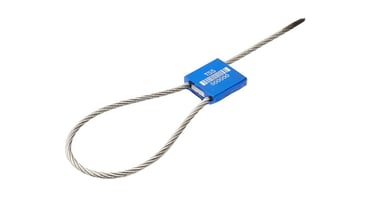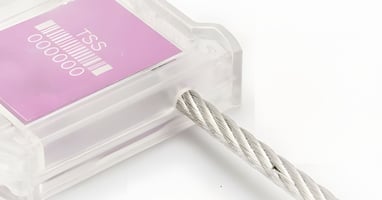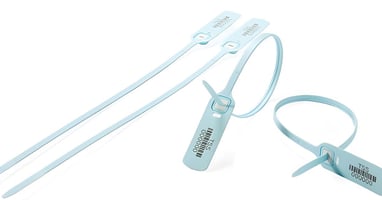Your organization depends on secure, reliable protection for valuable assets, equipment, and...
How To Ensure Your Security Seals Meet Industry Compliance

When it comes to safeguarding your goods and maintaining trust, security seals are your first line of defense. But securing your assets goes beyond simply applying a seal. It requires a strong commitment to meeting industry compliance standards.
Compliance is not just a formality. Compliance is a vital aspect of ensuring supply chain integrity, protecting sensitive materials, and adhering to legal obligations. Without it, businesses risk facing operational disruptions, costly fines, and a tarnished reputation.
Understanding how to ensure your security seals meet industry compliance is essential for businesses that value safety, efficiency, and credibility. Empower your business to maintain compliance while enhancing the security and reliability of your operations with this guide full of key steps and considerations.
Understand Relevant Industry Standards
Before selecting security seals for your operations, it’s crucial to identify the compliance regulations and standards that apply to your industry. Different sectors have unique requirements to ensure product safety and accountability. Here's an overview of some key standards.
Logistics Compliance
Compliance in logistics often revolves around ISO 17712, which sets performance and classification criteria for mechanical seals. To be compliant, seals must undergo specific testing for tamper resistance, strength, and quality. For shipping containers, high-security bolt seals meeting ISO 17712 standards are generally required.
Pharmaceutical Industry
Regulations like the FDA’s Current Good Manufacturing Practices (CGMPs) govern the pharmaceutical industry. Security seals in this sector must demonstrate strict tamper-evidence capabilities to protect against counterfeiting, contamination, and diverted shipments.
Food Safety
For food safety, compliance focuses on fresh, uncontaminated delivery. Standards such as Hazard Analysis Critical Control Point (HACCP) emphasize tamper-evident seals to prevent breaches in transporting perishable and consumable products.
Understanding your industry-specific standards is the first step toward compliance, ensuring that your operations align with both safety and legal mandates. For an actionable tip, create a compliance checklist specific to your industry. Consulting regulatory bodies or accredited agencies for guidelines can ensure you don’t overlook critical aspects.
Key Features of Compliant Security Seals
Not all security seals are created equally. Compliant security seals must meet certain benchmarks in design, material quality, and functionality. Below are the features to look for.
Tamper-Evidence
The foundation of compliance lies in seals with tamper-evident features. A compliant security seal makes unauthorized access obvious by showing discernible evidence of tampering, whether through broken parts, color changes, or distorted markings. This ensures accountability throughout the supply chain.
Durability and Material Quality
Security seals must withstand the stress and risks they’re exposed to in transit. Manufacturers favor polycarbonate or nylon for plastic seals and stainless steel for bolt and cable seals due to their durability. Their material integrity ensures seals are resistant to tampering tools and accidental breakage.
Temperature Resilience
For industries like pharmaceuticals and food, seals are often exposed to extreme temperature conditions during storage or transit. Make sure the seals you choose are capable of maintaining their efficacy in freezing conditions or intense heat.
Unique Identification Number
Compliance-ready seals typically feature unique serialized numbers or barcodes. These identifiers make it easier to track and validate the integrity of shipments, discouraging tampering as any replacement attempt would be conspicuous.
Focusing on these features allows you to implement seals that align with industry regulations and protect your supply chain.

Choose the Right Type of Security Seal
Selecting the right type of seal for your specific needs is critical. Different seals offer varying levels of security that suit unique applications.
Bolt Seals
Bolt seals are the gold standard in ensuring containerized freight complies with international requirements. Typically used in shipping and logistics, these seals are resistant to cutting or tampering and provide maximum security for sealed containers.
Cable Seals
Cable seals are often used in shipping and warehousing for their flexible yet robust protection. The design of these seals fits a range of application sizes and is ideal for securing valves, bulk bags, and large cargo.
Plastic Seals
Plastic seals are cost-effective and widely used across industries that prioritize tamper evidence over high mechanical strength, such as retail and food distribution. Their adjustability and versatility make them easy to use for shipments requiring quick inspections.
By matching the type of seal to its application and compliance requirements, you become one step closer to ensuring a secure, regulation-ready supply chain.
Work With Certified Suppliers
Every business should partner with seal manufacturers or suppliers who prioritize compliance. Certified suppliers, like Logimate, often have the expertise and resources necessary to produce seals that adhere to industry standards. Look for suppliers who possess certifications like:
- ISO 9001/17712: Demonstrates a commitment to quality management systems
- FDA/USDA approval: Essential for pharmaceutical and food-grade seals
- C-TPAT validation: Beneficial for logistics and international shipments
Certified suppliers often maintain detailed records of their processes, making it easier for businesses to verify compliance during audits.
Conduct Regular Audits and Inspections
Compliance doesn’t end once seals are in use. Implement a system for regular audits and inspections to ensure your seals are consistently meeting standards. Randomly inspect seals across shipments to detect signs of tampering or breakage. Consistent auditing also helps identify areas of improvement or emerging vulnerabilities in your supply chain security.
Train Your Team on Proper Usage
Even the best security seals are ineffective if misused. Train your logistics team on the proper application, removal, and documentation of seals.
- Ensure employees apply seals correctly, particularly high-security seals like bolt or cable seals, where improper application could compromise their performance.
- Educate the team on how to inspect seals for tampering and securely remove them without damaging items in the shipment.
- Log each seal’s unique ID to maintain a robust audit trail.
A well-trained team serves as another layer of defense, aligning your efforts toward full operational compliance.

Stay Updated on Regulatory Changes
Compliance requirements evolve alongside advancements in technology and higher industry standards. Commit to staying informed about regulatory updates relevant to your field. Subscribing to industry newsletters, attending trade events, or partnering with compliance consultants ensures your organization remains ahead of the curve.
Why Compliance Matters
Ensuring your security seals meet industry compliance goes beyond avoiding penalties. It’s about building trust with your partners and consumers. A compliant security system assures whoever you’re working with that their shipments are safe from tampering or theft.
Whether you’re securing pharmaceuticals, food products, or industrial goods, adhering to industry standards solidifies your reputation as a reliable and value-driven partner. More importantly, it demonstrates your commitment to safety, efficiency, and professionalism.
If you’re ready to take the next step in improving your supply chain security, start by evaluating your current practices. Use this guide as a blueprint for how to ensure your security seals meet industry compliance and work with Logimate, your trusted supplier, to access certified solutions.




